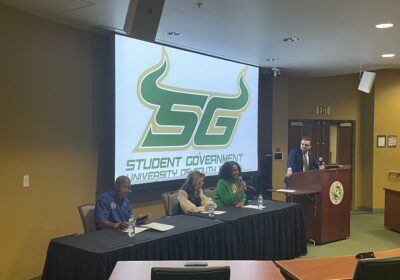Confusion surrounds SG court impeachments
While members of Student Government (SG) met Tuesday night to discuss the allocation of the almost $14.7 million Activity and Service (A&S) fee budget for next year, what also took place was an evening of allegations of blackmail and threats.
During the meeting, senator Abdool Aziz requested to withdraw his name from the memo requesting the impeachment of three justices on the SG Supreme Court.
What followed was an immediate recess filled with speculation and uncertainty.
After the meeting re-convened and Senate leaders discussed what this would mean, it is still uncertain what will happen in the impeachment process, which was launched after three SG senators, including Aziz submitted a memo accusing the justices of more than 30 ethics violations, including bias, bribery and coercion in the case that ultimately cleared Jean Cocco of grievances and declared him student body president elect.
“Speaking a little bit about the impeachment, I would say it’s not the way I envisioned it would happen,” Aziz said. “I feel that each side has escalated in their attempts on each other, and the process has become pretty tainted at this point. So, I’m going to rescind my signature.”
Before Aziz withdrew his name, however, senator Evan Brown said there was something that might have pressured Aziz into signing the memo.
“After Tuesday’s meeting, Mr. Aziz came to me as a friend and told me he was coerced and threatened with impeachment if he did not sign that memorandum for impeachment,” Brown said. “I understood him saying that certain members of the legislative and executive branches both threatened Mr. Aziz to sign the document and he … did not approve of the statement on the document.”
Though the Senate discussed whether Aziz should directly address the claims, Aziz did not comment on threats made against him.
While Senate President Shyam Patel said he couldn’t come up with words to describe the meeting, Senate President Pro Tempore Adam Aldridge said it wasn’t “the typical Senate meeting.”
“There were some tense moments, but I think its an important issue to address,” Aldridge said, also stating that the matter could be “exhausting,” but it was one that needs proper “time and thought.”
What sparked the cause to investigate the Supreme Court is still unclear, but Chief Justice Bryan Buenaventura had another announcement for the Senate: he had been informed of the presence of an unauthorized recording device left in the SG office that has since been removed, but was recording for an unknown amount of time.
Buenaventura said the recorder belonged to Associate Justice Corey McCance, and was brought to his attention last week when Director for Student Government Advising, Training & Operations Gary Manka told him that McCance presented information based on his recording.
At this time, it not clear what was recorded, but Buenaventura warned that anyone in the SG Supreme Court office was potentially recorded over the past few weeks.
Buenaventura said that the matter has been brought to Human Resources and the Office of Student Rights and Responsibilities.
After much discussion, the Senate decided to request a legal opinion about continuing the impeachment process as no current statutes define what happens when an accuser of an impeachment wishes to withdraw his signature — or even if one can withdraw his signature from such a document.
Options discussed by the Senate ranged from disbanding the committee to having another senator add his name to the memo, as statutes indicate at least three senators must support the memo. Patel said another senator could not add his name to the current memo, but a new memo could be submitted with new names to begin a new impeachment process.
Patel said the legal opinion is likely to come within the next three days. Until then, the impeachment committee will continue regular business, which could last the remainder of the semester or until the Senate makes a decision.






